He was all of 6 years old when Amjad Ali Khan gave his first recital of Sarod. It was the beginning of yet another glorious chapter in the history of Indian classical music. Taught by his father Haafiz Ali Khan, Amjad Ali Khan was born to the illustrious Bangash lineage rooted in the Senia Bangash School of music. Today he shoulders the sixth generation of inheritance in this legendary lineage.
After his debut, the career graph of this musical legend took the speed of light, and on its way the Indian classical music scene was witness to regular and scintillating bursts of Raga supernovas. Thus, the world saw the Sarod being given a new and yet timeless interpretation by Amjad Ali Khan. Khan is one of the few maestros who consider his audience to be the soul of his motivation. As he once said, "There is no essential difference between classical and popular music. Music is music. I want to communicate with the listener who finds Indian classical music remote."
He is a recipient of the UNESCO Award, Padma Vibhushan (Highest Indian civilian award), Unicef's National Ambassadorship, The Crystal Award by the World Economic Forum and Hon'ry Doctorates from the Universities of York in 1997, England, Delhi University in 1998, Rabindra Bharati University in 2007, Kolkata and the Vishva Bharti (Deshikottam) in Shantiniketan in 2001. He has represented India in the first World Arts Summit in Venice in 1991, received Hon'ry Citizenship to the States of Texas (1997), Massachusetts (1984), Tennessee (1997), the city of Atlanta, Georgia (2002), Albuquerque, NM (2007)and the Key of the City of Tulsa, Oklahoma and Fort Lauderdale, Miami. April 20th, 1984 was declared as Amjad Ali Khan Day in Boston, Massachusetts. In 1995, Mr. Khan awarded the Gandhi UNESCO Medal in Paris for his composition Bapukauns. In 2003,the maestro received “Commander of the Order of Arts and letters” by the French Government and the Fukuoka Cultural grand prize in Japan in 2004.
His collaborations include a piece composed for the Hong Kong Philharmonic Orchestra conducted by Yoshikazu Fukumora titled Tribute to Hong Kong, duets with guitarist Charley Byrd and Violinist Igor Frolov. He has been a visiting professor at the Stanford University, Indiana University, York University, Washington University, Stony Brook, North Eastern and New Mexico University. BBC Magazine had voted one of his recent CDs titled ‘Bhairav’ among the best 50 classical albums of the world for the year 1995. In 1994, his name was included biographically in "International Directory of distinguished Leadership", 5th edition. In 1999, Mr. Khan inaugurated the World Festival of Sacred Music with His Holiness the Dalai Lama. In 1998, Khan composed the signature tune for the 48th International Film Festival.
Recently, the Khans collaborated with American Folk artist Carrie Newcomer at Lotus Arts Festival in Bloomington. On the ninth anniversary of 9/11, Amjad Ali Khan gave a Peace Concert at the United Nations in New York in the presence of the UN Secretary General Ban-Ki-Moon.

He has been a regular performer at the Carnegie Hall, Royal Albert Hall, Royal Festival Hall, Kennedy Center, Santury Hall (First Indian performer), House of Commons, Theater Dela ville, Musee Guimet, ESPLANADE in Singapore, Victoria Hall in Geneva, Chicago Symphony Center, Palais beaux-arts, Mozart Hall in Frankfurt, St. James Palace and the Opera House in Australia.
In his case, the term 'beauty of the Ragas' acquires a special meaning as he has to his credit the distinction of having created many new Ragas. It is love for music and his belief in his music that has enabled him to interpret traditional notions of music for a new refreshing way, reiterating the challenge of innovation and yet respecting the timelessness of tradition.
Two books have been written on him. The first is titled, ‘The world of Amjad Ali Khan’ by UBS Publishers in 1995 and the second, ‘Abba-God’s Greatest Gift to us’ by his sons, Amaan and Ayaan published by Roli Books-Lustre Publications in 2002. A documentary on Mr. Khan called ‘Strings for Freedom’ won the Bengal Film Journalist Association Award and was also screened at the Ankara Film Festival in 1996.
To mark the Hundred years of Gandhi’s Satyagrah Movement, Amjad Ali Khan presented a Concert at Carnegie Hall in 2006. In 2007, Mr. Khan featured in the Southbank Centre’s recently launched the Royal Festival Hall hoardings project ‘Rankin’s Front Row’, where his photograph is included in the frieze that will run the length of the river façade of the Royal Festival Hall. Khan performed at the Central Hall of the Indian Parliament on the commemoration of India's 60th year of Independence in 2007.

In 2008, his is concerto for Sarod, Samaagam premiered with the Scottish Chamber Orchestra at St Magnus Festival, at Kirkwall, Orkney Islands. This was an extraordinary collaboration with the Scottish Chamber Orchestra, which was the latest embodiment of his unique ability to give new form to the purity and discipline of the Indian classical music tradition. In 2009, Mr. Khan presented his Sarod concerto Samagam with the Taipei Chinese Orchestra. The same year Amjad Ali Khan was nominated for a Grammy award in the best traditional world music album category. Khan had been nominated for the album 'Ancient Sounds', a joint-venture with Iraqi oud soloist Rahim Alhaj. Samaagam was released worldwide in April 2011 on Harmonia Mundi’s World Village label. In the season 11/12, Amjad Ali Khan was the focus of a 4-concert residency at the Wigmore Hall in London including a new piece with the Britten Sinfonia. Over years, the concerto has been performed by Britten Sinfonia, Welsh National Opera, Chicago Philharmonic Orchestre National d'lle de France, Orchestre d'Auvergne, London Philharmonia, Gulbenkian Orchestra and Scottish Chamber Orchestra. Recently, Norwegian Radio Orchestra played this piece with conductor Maestro Markus Lehtinen, Refugee Orchestra Project, New Jersey Symphony with Conductor Xian Zhang, Norwegian Radio Orchestra, Moscow State Philharmonic and Atlanta Symphony Orchestra.
Other highlights include recitals at the Edinburgh International Festival, the Enescu Festival in Bucharest. Recently, he was awarded the Fellowship of the Sangeet Natak Academy. In spring this year Sarod maestro Amjad Ali Khan brought his teaching philosophy to Stanford University this year in a residency titled Indian Classical Music: A Way of Life. As a finale to the Maestro’s residency, Amjad Ali Khan performed with Conductor Jindong Cai and the Stanford Philharmonia at the Mozart and More Festival. Khan authored his first book, My Father, Our Fraternity in December 2012, an intensely personal memoir which brings alive the rich classical music tradition from the early twentieth century to the present. Amjad Ali Khan offers an insider’s view of this era, through the life and times of his father, the famous sarod icon, Haafiz Ali Khan. The personal and the professional are intertwined in this book as they are in the author’s life.
In 2013, Ananta Opus 195 Written by Pierre Thilloy and performed by Sarod maestro Amjad Ali Khan, Amaan Ali Bangash and Ayaan Ali Bangash with the Avignon Provence Symphonic Orchestra and the Kords Collective premiered a concerto for Sarod, symphonic and electronic orchestra, conducted by Samuel Jean. Same year, Amjad Ali Khan presented his Sarod Concerto Samaagam along with Orchestre d'Auvergne and Orchestre national d'Île de France conducted by Kaspar Zehnder in France.
In March 2014, the Permanent Mission of India to the United Nations, along with the UN Academic Impact (an initiative of the Department of Public Information of the UN) organised a Special Musical Concert titled : "Music for Peace" on 24 March 2014 at the Dag Hammarskjold Library Auditorium at the United Nations. The event featured a recital on the Sarod, by one of the greatest living exponents of the instrument, Sarod Maestro Amjad Ali Khan. August 2014 saw an exciting India Tour with Britten Sinfonia, one of the world's most celebrated and pioneering ensembles.
In 2014, Amjad Ali Khan, Amaan Ali Bangash and Ayaan Ali Bangash performed at the prestigious Nobel Peace Prize Ceremony in Oslo, Norway on as well as the Nobel Peace Prize Concert along with the lineup of Queen Latifa, Steven Tyler, Nuno Bettencourt and Laura Mvula. Amjad Ali Khan and his widely acclaimed disciples and sarod virtuosi Amaan Ali Bangash and Ayaan Ali Bangash were recently felicitated at the coveted Global Music Awards under the Gold Medal category for their outstanding contribution to the global music industry and excellence in the classical music sphere Global Music Awards are prestigious and are increasingly recognized by industry insiders to give legitimacy to outstanding artists. The top tier honour was bestowed on the trailblazing trio in correlation with their “Peace Worshipers” album which was released in July 2017 by Affetto Records and distributed by Naxos.
The UNDay Concert 2018 featured Sarod virtuoso Amjad Ali Khan, accompanied by his sons Amaan Ali Bangash and Ayaan Ali Bangash, and the Refugee Orchestra Project conducted by Lidiya Yankovskaya, Conductor. This year’s concert dedicated to Mahatma Gandhi was themed on “Traditions of Peace and Non-violence” in the presence of António Guterres, Secretary General of the United Nations.
In 2019, Amjad Ali Khan presented his Sarod Concerto with New Jersey Symphony Orchestra conducted by Maestro Xian Zhang for three nights at NJPAC and State Theatre. The Concerto was also presented by Adelaide Symphony Orchestra and Dayton Philharmonic Orchestra. In 2020, STRINGS FOR PEACE: Premieres for Guitar & Sarod released with Sharon Isbin. Amjad Ali Khan recently Joined Gwen Stefani, Jon Bon Jovi for the Rock and Roll Hall of Fame Inductee and multi-GRAMMY Award winning musician Joe Walsh’s Vetsaid Charity Concert 2020 and 2021. Amjad Ali Khan with Joe Walsh came together with a 3 song EP named ‘Prayers’ as a tribute to doctors, frontline workers and for everyone who is going through these trying times. It's a wonderful project where the East meets West with an idea to bring the spirit of sharing the great unique treasures of their own artistic traditions, as well as finding common ground at both the cellular and cosmic levels of two musical traditions, which are often held to be radically different. Amjad Ali Khan has also been announced as Associate Artists at Wigmore Hall, in advance of the Hall’s 120th anniversary celebrations and is committed to a five-year relationship with the Hall, performing at least once every season.
Married and with two sons, Amaan Ali Bangash and Ayaan Ali Bangash are well known names in the music scene and are the seventh generation of musicians in the family. Amjad Ali Khan's wife Subhalakshmi Khan has been a great exponent of the Indian classical dance, Bharatnatyam, which, she sacrificed for her family. As a soul, so in his heart, he is a man who has proven his indomitable belief in the integration of two of life's greatest forces, love and music. He is a living example of a man who practices that integration each day of his life, both on stage and off stage.
Keeping India’s ethos of traditions and legacies alive, both his grandsons, Zohaan Ali Bangash and Abeer Ali Bangash are taking the family’s musical journey forward and have started performing from the age of 10. They perform occasionally with tier grandfather, Amjad Ali Khan father Ayaan Ali Bangash and Uncle Amaan Ali Bangash as a Sarod Quintet. They recently performed at the newly opened Nita Mukesh Ambani Cultural Centre in Mumbai in July 2023 and gave their New York debut at Symphony Space in August 2023. They will give their UK debut concert at the historic Wigmore Hall earlier this year.
Even before Ustad* Haafiz Ali Khan gave his Sarod his magic touch at a public performance, the atmosphere used to become electric. He possessed a magnetic presence. Tall, massive fair with a neatly trimmed beard, Ustad Haafiz Ali Khan was more than handsome. He was overwhelming with his charming manners and large eyes, as eloquent as his exquisite music which was not just an artistic performance but a form of prayer. No wonder, for every stroke of melody which he produced resulted from a superb combination of nimble fingers, a clear intellect and a magnificent heart, that could be brought off only by a spiritual compulsion. Of such stuff is a real musical phenomenon made . Greatness at this level is essentially an autonomous happening but background help. Ustad Haafiz Ali Khan was born in an ambience of old-world courtliness and music. His great grandfather came from Afganisthan with a talent for the Rabab. His grandfather Ustad Ghulam Ali Khan carried on the good work; with his modifications the Sarod as we know it today came into its own.
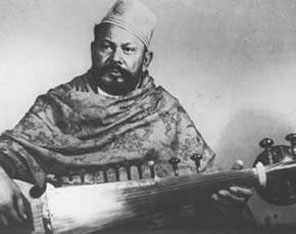
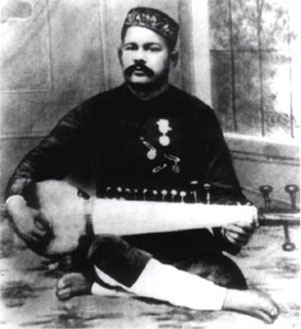
He was initiated in the tradition of the senia gharana by Ustad Pyar Khan and Ustad Jafar Khan, direct descendants of the line of Tansen. The influence of the school was passed on to his grandson. This was Ustad Haafiz Ali Khan's rich inheritance. To this was added his grounding in dhrupad and dhamar under the guidance of Shri Ganeshilalji of Mathura, descendant of Swami Haridas, Mian Tansen's guru. And to round it off, he sat at the feet of Ustad Wazir khan of Rampur. The patronage Ustad Haafiz Ali Kahan received from the court of Gwalior subsequently added polish and perfection. The rest was individual talent - the man himself symbolising creativity harnessed to purity. Accolades came in profusion throughout his life.
From audiences who drank in his music with ecstasy,and from public bodies. In The early 1940's he was honoured with the title of Aftab-e-Sarod by the All Bengal Music Conference in Calcutta and Sangeet Ratna Alankar by The Maharaja of Gwalior. In 1952 He received the Sangeet Natak Akademi Award and the next year was made a fellow of the Akademi. The Universities of Visva Bharti and Khairagharh conferred doctorates on him, To cap it all came the award of Padma Bhushan in 1960. Ustad Haafiz Ali Khan spanned four generations. Meanwhile, the milieu has changed, so have the tastes and habits of the music buffs.
From the glittering courts to public performances in these hard times-its is a strange metamorphosis. the Ustad lived to transcend it and even after his death in 1972 at the age of 95, his art lives on in the work of his sons- Mubarak Ali Khan, Remat Ali Khan and Amjad Ali Khan.
Born in the well known Borooah family of Assam, art and culture was part of Subhalakshmi's life from a tender age. Her father Shri Parashuram Borooah, a tea industrialist and the Hero of the first Assamese film 'Joymati ', and her uncle Shri P.C.Borooah, a former member of parliament, was the first Assamese gramophone artist of great repute. Subhalakshmi's grand father Mr. Lakshmi Ram Borooah was the only Assamese exponent of Indian classical music of his time. As pioneers in preserving culture in Assam, the Borooah family were known for their contribution.
Early years saw Subhalakshmi trained in the Manipuri style of dance which won her distinction for her ability to execute this graceful style from the North East of India. 'A young dancer with a promise to keep' - that's how Subhalakshmi's single minded devotion and dedication to dance can best be described. She joined the most famous dance institution 'Kalakshetra' in Madras headed by Smt. Rukmani Devi Arundale, an eminent danseuse of her time. Subhalakshmi graduated in 'Bharatnatyam' with a five year diploma course in first class honours and proceeded to do her two year post graduation in which she passed out with distinction in 1967. A seriously gifted artist Subhalakshmi's style imparted the unmistakable stamp of Kalakshetra, the highly conservative Academy. All her dance revealed her superb training and technical perfections. Intrinsic clarity of her foot work in the range and nuances of her execution showed Subhalakshmi's artistic display, a maturity beyond her years.
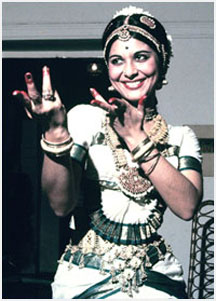
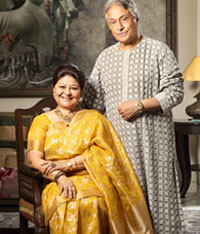
The very first performance in 1967, the public and press were taken by storm. So charmed were they by the magic quality infused in her flawlessly pure style that already placed her far above the average. From that point onwards there was no looking back.
Her dancing feet tinkled on stage all over the country to sheer brilliance of her gift caught the discerning eye of the Govt. of India. The result was the cultural delegation,carrying the time honoured Indian Dance to foreign soils. In 1970, Subhalakshmi did a world wide tour of Hungary, Czechoslovakia, Romania, West Germany, England, France, Belgium and Holland, leaving behind an enthralled audience. The following year, she was the rear few to be selected to dance at the 'Man and his World' festival in Canada and gave lectures demonstrations in USA and Japan. More tours abroad bought fresh Kudos and more praises for her in the the following years Subhalakshmi is the recipient of many awards and laurels. The Shirumani award, the critics award and the prestigious state award to name a few ..
In 1976, Subhalakshmi married India's master musician Sarod Maestro Amjad Ali Khan. It was the respect for each others art that brought them together. Blessed with two sons Amaan and Ayaan, Subhalakshmi continued with her rare appearances on stage, off and on for charitable causes till, she gave up dancing in 1985. Today Subhalakshmi is responsible for taking care of the professional aspects of her husband's and children's
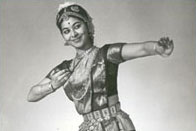
FEB
22
Strings for Peace (Amjad Ali Khan, Sharon Isbin, Amaan Ali Bangash and Ayaan Ali Bangash)
Herbst Theatre,

FEB
21
Amjad Ali Khan, Amaan Ali Bangash and Ayaan Ali Bangash
Meany Hall – Katharyn Alvord Gerlich Theater,

JAN
25
Amjad Ali Khan, Amaan Ali Bangash and Ayaan Ali Bangash
London Philharmonic Orchestra Royal Festival Hall

